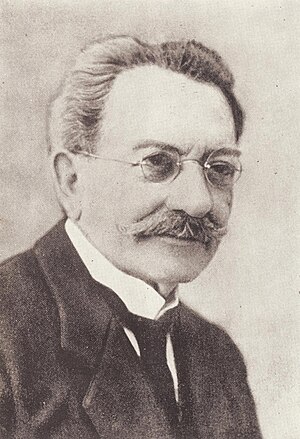| dbo:abstract
|
- Lazare Sainéan (* 23. April 1859 in Ploiești; † 11. Mai 1934 in Paris) war ein rumänischer Romanist, der dreißig Jahre lang in Frankreich wirkte. (de)
- Lazăr Șăineanu (Romanian pronunciation: [ˈlazər ʃəiˈne̯anu], also spelled Șeineanu, born Eliezer Schein; Francisized Lazare Sainéan, French pronunciation: [lazaʁ sa.ine.ɑ̃], or Sainéanu; April 23, 1859 – May 11, 1934) was a Romanian-born philologist, linguist, folklorist and cultural historian. A specialist in Oriental and Romance studies, as well as a Germanist, he was primarily known for his contribution to Yiddish and Romanian philology, his work in evolutionary linguistics, and his activity as a literary and philological comparatist. Șăineanu also had innovative contributions to the investigation and anthologizing of Romanian folklore, placed in relation to Balkan and East Central European traditions, as well as to the historical evolution of Romanian in a larger Balkan context, and was a celebrated early contributor to Romanian lexicography. His main initiatives in these fields are a large corpus of collected fairy tales and the 1896 Dicționarul universal al limbii române ("The Universal Dictionary of the Romanian Language"), which have endured among the most popular Romanian scientific works. A member of the non-emancipated Jewish-Romanian community, Lazăr Șăineanu stood for the Haskalah (Jewish Enlightenment) ideas, and opted in favour of Jewish assimilation into the Romanian mainstream. His repeated requests for naturalisation were eventually unsuccessful, but propelled him to the center of a political conflict which opposed the antisemitic current to the advocates of tolerance. In 1901, Șăineanu and his family quit the Kingdom of Romania and resettled in France, where the scholar lived until his death. Becoming known for his pioneering work to the study of Middle French and his investigations into the origins of argot, as well as for his critical essays on 16th-century writer François Rabelais, he was a recipient of the Institut de France's Volney Prize for 1908. The son in law of publisher , Șăineanu was survived by his brother , a noted lexicographer, journalist and polemicist. (en)
- Lazare Sainéan (né Eliezer Schein / Lazăr Şăineanu en 1859 à Ploiești en Roumanie et mort en 1934 à Neuilly-sur-Seine), est un philologue et linguiste roumain qui a étudié la philologie du roumain, des registres du français comme l'argot et principalement la langue de François Rabelais. (fr)
|
| dbp:caption
|
- First page of Studii folclorice, cercetări în domeniul literaturii populare, 1896 (en)
- First page of Basmele române în comparațiune cu legendele antice clasice și în legătură cu basmele popoarelor învecinate și ale tuturor popoarelor romanice, 1895 (en)
- First page of Istoria filologiei române, studii critice with a preface by Bogdan Petriceicu Hasdeu, 1892 (en)
- First page of Influența orientală asupra limbii și culturii române, volume I, 1900 (en)
|
| rdfs:comment
|
- Lazare Sainéan (* 23. April 1859 in Ploiești; † 11. Mai 1934 in Paris) war ein rumänischer Romanist, der dreißig Jahre lang in Frankreich wirkte. (de)
- Lazare Sainéan (né Eliezer Schein / Lazăr Şăineanu en 1859 à Ploiești en Roumanie et mort en 1934 à Neuilly-sur-Seine), est un philologue et linguiste roumain qui a étudié la philologie du roumain, des registres du français comme l'argot et principalement la langue de François Rabelais. (fr)
- Lazăr Șăineanu (Romanian pronunciation: [ˈlazər ʃəiˈne̯anu], also spelled Șeineanu, born Eliezer Schein; Francisized Lazare Sainéan, French pronunciation: [lazaʁ sa.ine.ɑ̃], or Sainéanu; April 23, 1859 – May 11, 1934) was a Romanian-born philologist, linguist, folklorist and cultural historian. A specialist in Oriental and Romance studies, as well as a Germanist, he was primarily known for his contribution to Yiddish and Romanian philology, his work in evolutionary linguistics, and his activity as a literary and philological comparatist. Șăineanu also had innovative contributions to the investigation and anthologizing of Romanian folklore, placed in relation to Balkan and East Central European traditions, as well as to the historical evolution of Romanian in a larger Balkan context, and w (en)
|




